Behold My Servant
Sermons on Isaiah 52:13-53:12
500 in stock
| ISBN | 9781800405080 |
|---|---|
| Binding | Cloth-bound |
| Format | Book |
| Page Count | 160 |
| Banner Pub Date | 2025 |
| The Author | Calvin, John |
| Subtitle | Sermons on Isaiah 52:13-53:12 |
Of the many sermons which Calvin preached on the Book of Isaiah between July 1556 and August 1559, only eleven were published in his lifetime. Seven of them are newly translated here, all on Isaiah’s Fourth Servant Song (Isa. 52:13–53:12). In a series of stunning scenes which have no parallel in prophetic literature, Isaiah delineates the figure of one who is both sacrificial victim and God’s agent of salvation. In identifying the Servant with Jesus Christ, Calvin is at one with the witness of the Universal church. In this memorable sermon series, the Reformer explores with sensitivity Isaiah’s contrasting themes of humiliation and exaltation, death and resurrection. At the same time, he demonstrates how great is the power by which God wrests victory from defeat, and how immeasurable is our debt to redeeming love.
Interview with the Translator
Read Robert White’s reflections on years of Calvin translation, along with his assessment of the work that remains to be done here.
Table of Contents Expand ↓
Introduction...................................................................................ix
(1) The Servant of the Lord (Isa. 52:13–53:1)...............................1
(2) A Rock of Offence (Isa. 53:1–4)...............................................19
(3) Stricken for our Iniquities (Isa. 53:4–6)..................................37
(4) A Lamb to the Slaughter (Isa. 53:7–8)....................................55
(5) Seed for Many Generations (Isa. 53:9–10)..............................71
(6) The Travail of His Soul (Isa. 53:11).........................................89
(7) Our Advocate and Intercessor (Isa. 53:12)..............................107
Prayers Accompanying the Weekday Sermon.............................125
Related products

Romans 7:1-8:4
Volume 6: The Law, Its Functions and Limits
Description
Of the many sermons which Calvin preached on the Book of Isaiah between July 1556 and August 1559, only eleven were published in his lifetime. Seven of them are newly translated here, all on Isaiah’s Fourth Servant Song (Isa. 52:13–53:12). In a series of stunning scenes which have no parallel in prophetic literature, Isaiah delineates […]
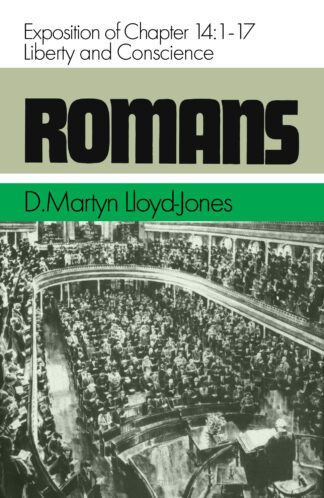
Romans 14
Volume 14: Liberty and Conscience
Description
Of the many sermons which Calvin preached on the Book of Isaiah between July 1556 and August 1559, only eleven were published in his lifetime. Seven of them are newly translated here, all on Isaiah’s Fourth Servant Song (Isa. 52:13–53:12). In a series of stunning scenes which have no parallel in prophetic literature, Isaiah delineates […]

Romans 6
Volume 5: The New Man
Description
Of the many sermons which Calvin preached on the Book of Isaiah between July 1556 and August 1559, only eleven were published in his lifetime. Seven of them are newly translated here, all on Isaiah’s Fourth Servant Song (Isa. 52:13–53:12). In a series of stunning scenes which have no parallel in prophetic literature, Isaiah delineates […]

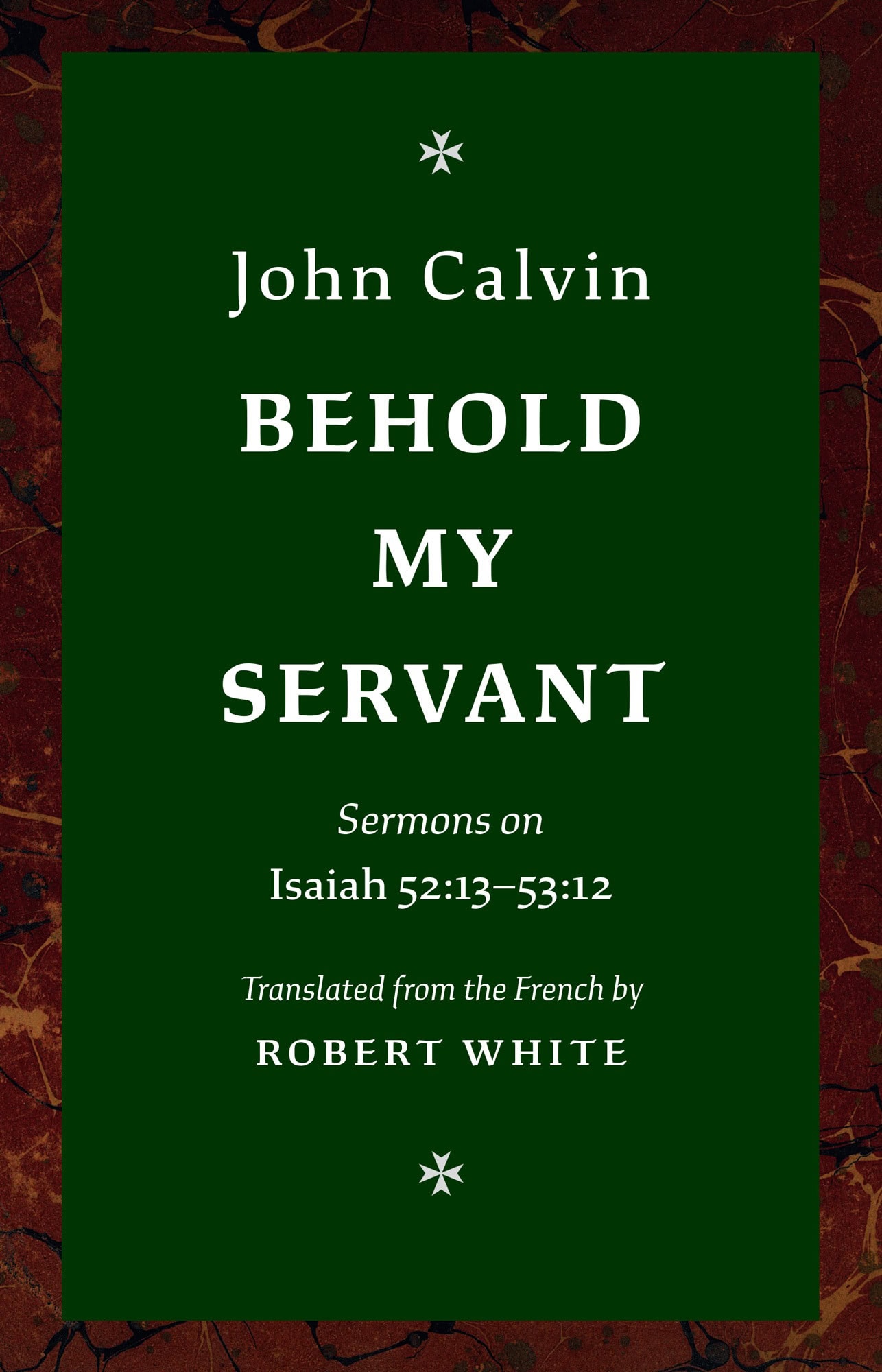
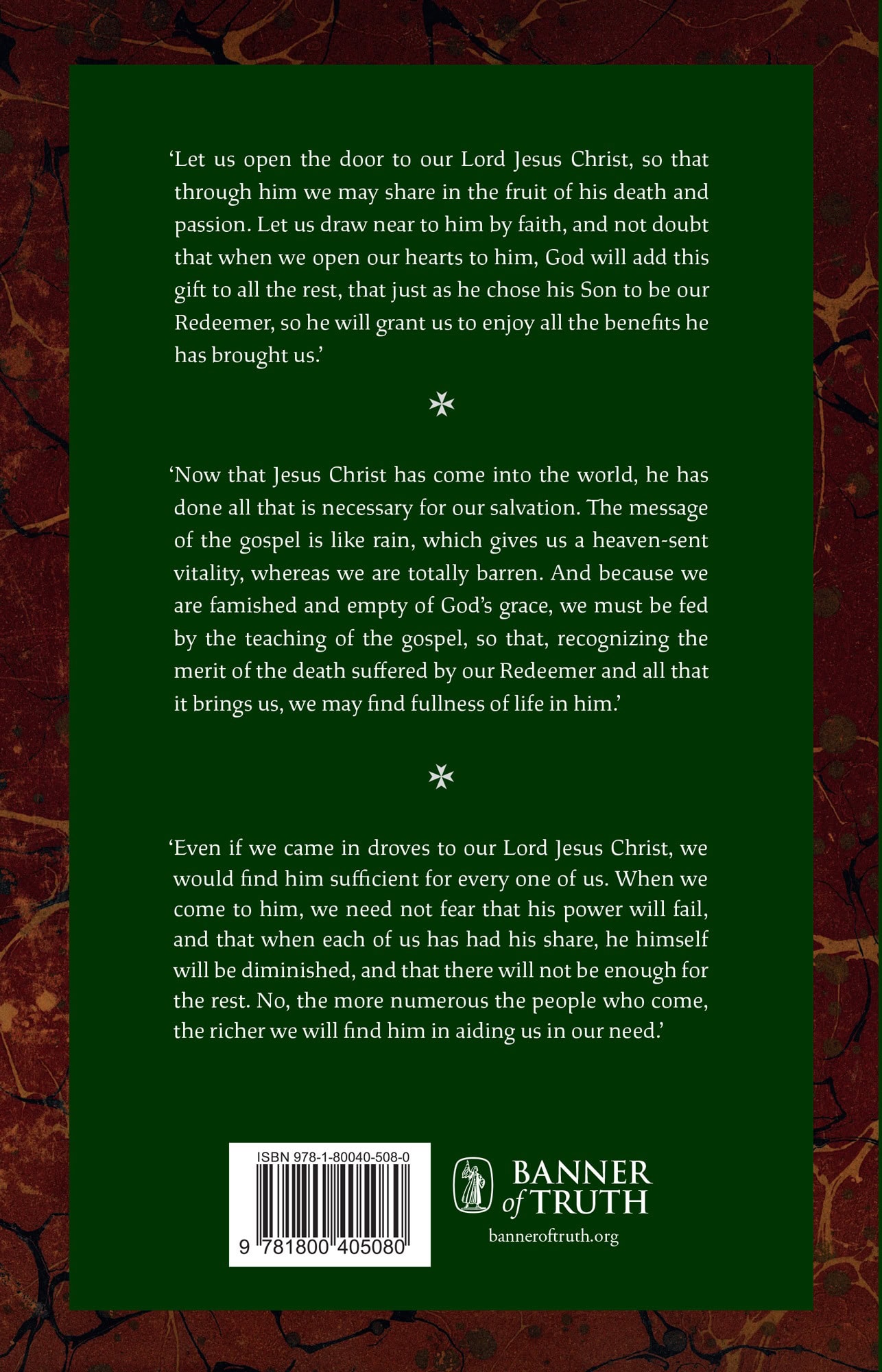


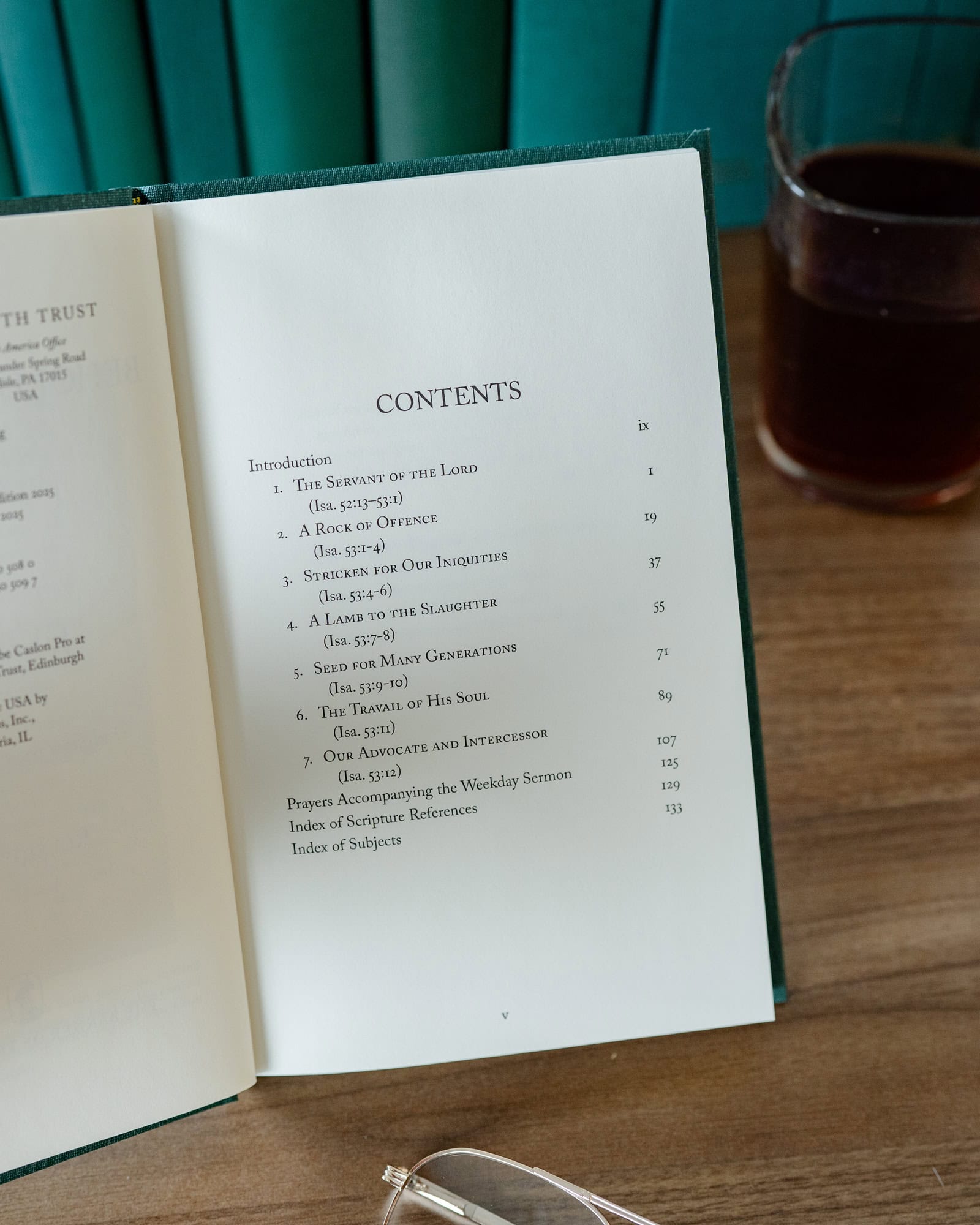
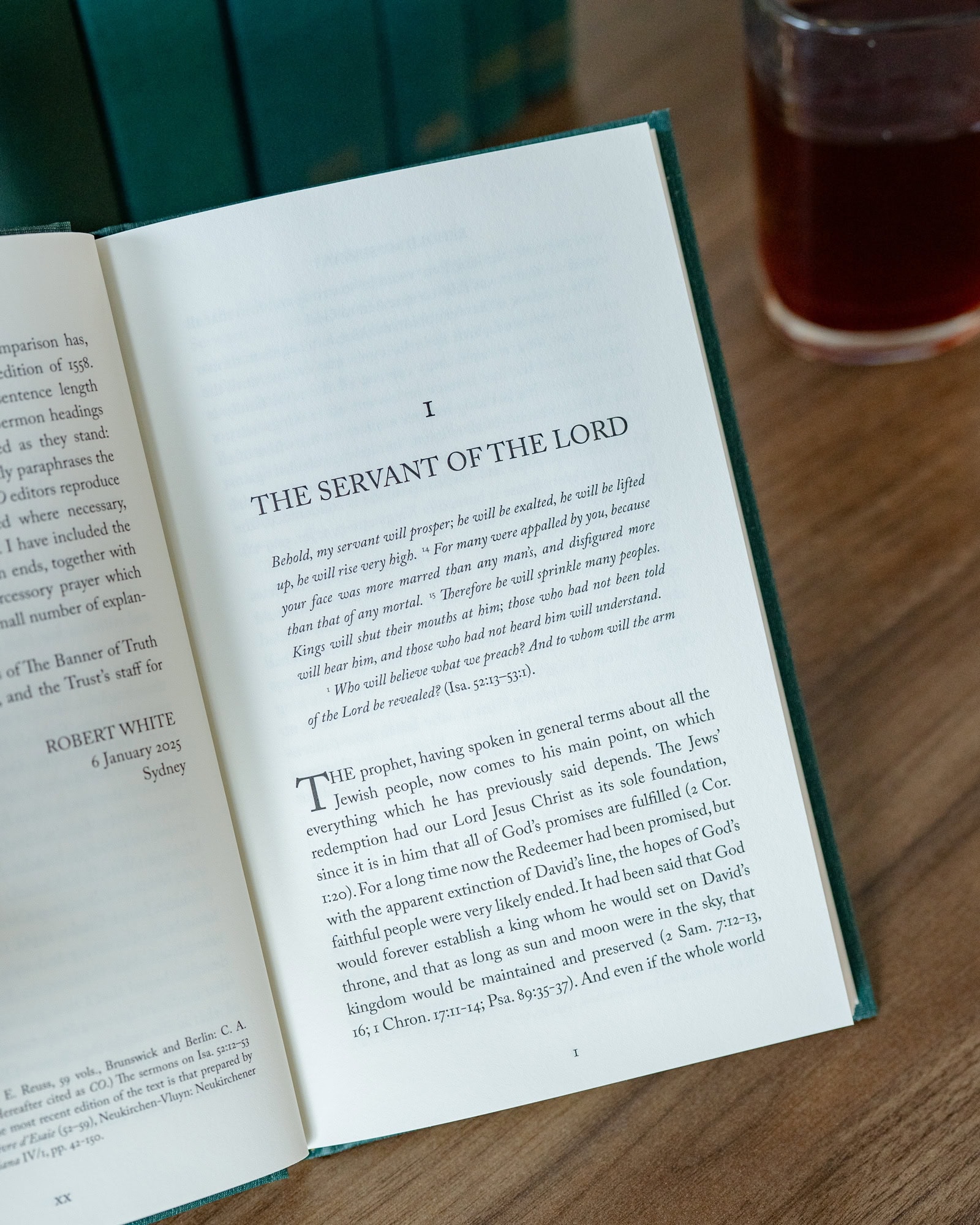
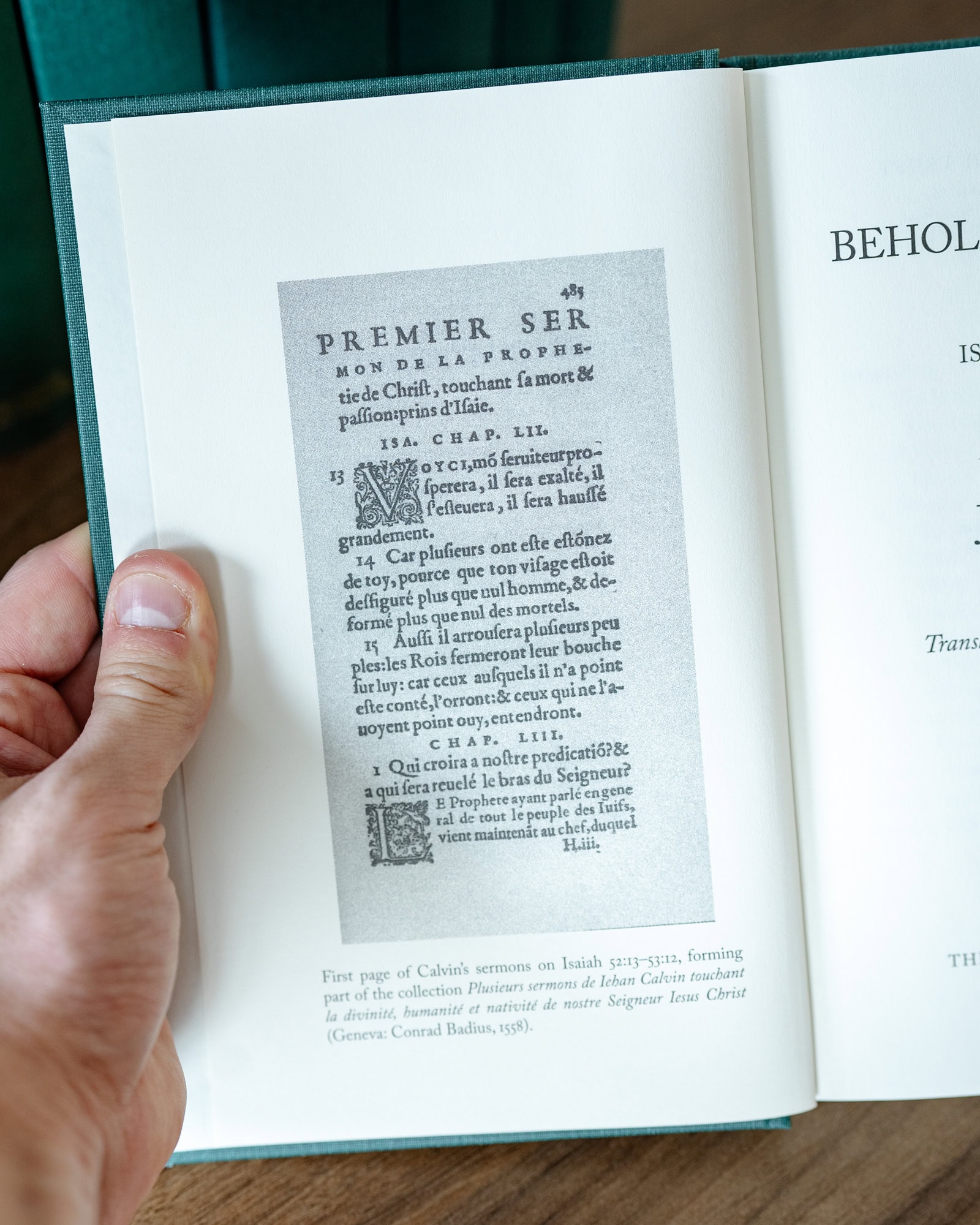


Joseph Wolcott (Creeds, Confessions, and Catechisms) –
The present review consists of three parts: Aesthetics, Content, and Translator.
Regarding aesthetics, this little book is gorgeous. The dust jacket is well-designed. The cover itself looks really nice on the shelf. The type and format is very easy on the eyes. This is about what you’d expect from a Banner of Truth hardcover, and I mean that as a very high compliment.
The content of this book is wonderful. As a general rule, you should read the introduction of books. Robert White’s introduction here is especially helpful, giving the reader good background on Calvin’s preaching in general, the history of his sermons on Isaiah in particular, and the theology of these specific sermons on Isaiah. Once you get past the introduction and into Calvin himself, it just keeps getting better and better. Calvin was a brilliant theologian and exegete of scripture, but he was also a faithful pastor. Most people are familiar with the former but not the latter. This book is one of a growing body of work that seeks to change this unfamiliarity. It’s truly a wonderful and edifying read!
Much could be said about the translator, Robert White. I can’t comment on the quality of the translation, as I don’t know French. What’s beyond doubt for me, however, is that White is quickly asserting himself (rightly so) as one of the greats of Calvin scholarship, up there with names like Henry Beveridge and Ford Lewis Battles. Whereas Beveridge and Battles made great contributions in translating Calvin’s theological works, White has had a unique impact in his overwhelming (though not exclusive) focus on Calvin’s sermons. I commend White for his contributions, and I truly believe he will go down as one of the greats.
In short, this volume is well worth the investment. It’s a wonderful blend of theological rigor, pastoral piety, and Christological clarity.
Aaron Lee –
In Behold My Servant, Banner of Truth presents John Calvin’s sermons on Isaiah 52:13–53:12. Translated from the original French by Robert White, this collection is a powerful exposition on one of the most stunning passages in Scripture.
Christ the Small Shoot
I was most moved to read how Jesus was described as a small shoot, a root springing from dry ground. Calvin says that although Christ was insignificant, God caused Him to grow. He increased and flowered in all His glory. Christ was a small shoot, but grew up to give shade to the whole world. Calvin goes on to explain that the dry ground correlates to people asking, “Is not this the carpenter’s son? Don’t we know how He was raised? And what school did He learn at to become so great a teacher?” Like the growth of Christ, I saw the growth and spread of the gospel and the plans of God to be unstoppable.
I found this book to be encouraging. When Christ is not esteemed, Christians should remember that we will be treated the same. But we can also trust that God will, in the end, exalt His Son and make us victorious.
The Paradox of the Cross
I saw the paradox of how God could say, “This is my beloved Son, in whom I am well pleased—listen to Him,” yet also afflict Him for our transgressions. It’s a holy and heavy thought—yet we can be sure that He will pardon our sins and welcome us as His beloved children, since our curse was ended on the cross.
I was especially interested to read how we could use silence to give God glory. Calvin says that God’s Son showed silence, as a lamb led to slaughter, who did not open His mouth. In the same way, we can hold our tongues when we are being mistreated, but also when we are being tested by God. This does not mean we do not pray—rather, it means we do not protest. Calvin turns the tables in an incredible way by saying that now Christ’s mouth is always open, being ever ready to intercede in order to remedy all the offenses we have committed.
Marvel at the Messiah
Those interested in Calvin will want to check out this volume for his brilliance on a standout section of Scripture. Those new to Calvin will see the great Reformer as a pastor, and one who sees the beauty of his Savior. All will wonder at the grace of God, behold the mystery of the cross, and marvel at the Messiah—the Suffering Servant of the Lord.
I received a media copy of Behold My Servant and this is my honest review
Marc Daniel Rivera (KristiyaKnow) –
Some books demand slow reading, not because they are dense for the sake of being difficult, but because every page is rich with truth that must be digested carefully. Behold My Servant is exactly that kind of book. Published by Banner of Truth in their handsome cloth-bound format, this volume contains seven sermons from John Calvin on Isaiah’s fourth Servant Song (Isa. 52:13–53:12). Preached in Geneva in 1558, these sermons show Calvin at his most pastoral—opening the Scriptures, pointing to Christ, and pressing home the gospel with urgency.
These sermons are remarkable for several reasons. Out of the 343 sermons Calvin preached on Isaiah between 1556 and 1559, only eleven were published in his lifetime. Seven of those sermons were on this very passage, Isaiah 52:13–53:12—the clearest Old Testament prophecy of Christ’s suffering and glory. This volume makes them freshly available in a new, careful translation. For readers today, it is a rare chance to hear Calvin not in the format of a commentary but in the living voice of preaching.
The structure of the book follows the flow of the Servant Song itself: The Servant of the Lord (Isa. 52:13–53:1), A Rock of Offence (53:1–4), Stricken for Our Iniquities (53:4–6), A Lamb to the Slaughter (53:7–8), Seed for Many Generations (53:9–10), The Travail of His Soul (53:11), and Our Advocate and Intercessor (53:12). Each sermon ends with a prayer, showing not just Calvin’s teaching but his dependence on God. These prayers themselves are a gift, giving us a glimpse of the Reformer’s pastoral heart.
Calvin’s central theme is clear: the Servant is none other than Jesus Christ. For him, the humiliation and exaltation of the Servant mirror the gospel itself. Christ is the Lord of glory, yet He took the form of a servant. He bore our iniquities, was despised and rejected, endured the curse, and yet through that suffering brought life to many. Again and again, Calvin drives home what he calls the “joyful exchange”—Christ’s innocence for our guilt, His righteousness for our sin. In this, he draws from Isaiah, but he also weaves in the wider witness of Scripture: from the Gospels, to Paul, to Peter’s exhortations.
What I like most about this book is how pastoral these sermons are. Calvin is not content with abstract theology. He presses his hearers to “come to Jesus Christ.” He insists that salvation is not simply a doctrine to be admired but a reality to be received with humility and faith. Again and again, he points to the sufficiency of Christ: there is no lack in Him, no limit to His mercy, no need that He cannot meet.
Robert White’s translation is also noteworthy. He was able to capture the vividness of Calvin’s language. At times, Calvin speaks with striking urgency: Christ “ventured all regardless” in order to accomplish redemption. Elsewhere, he lingers on the costly nature of Christ’s work—describing Him as “our remedy,” who healed us by His own wounds. These are not the dry words of an academic theologian; they are the cries of a pastor who knew that his congregation’s eternal destiny depended on their response to the gospel. The translation captures Calvin’s flow without weighing the reader down. Compared with his full commentaries, these sermons are surprisingly direct and warm.
Why does this book matter today? Calvin anchors us again in the heart of the gospel—the substitutionary suffering and triumphant exaltation of Christ. Here is theology with weight and urgency. Here is preaching that calls for repentance, faith, humility, and gratitude. Isaiah’s Servant Song is the passage most often echoed in the New Testament when the apostles describe Christ’s death and resurrection. No Old Testament prophet stands closer to the cross than Isaiah, and no preacher makes that clearer than Calvin.
Final thoughts:
Behold My Servant is a living preaching. Calvin’s voice still rings across the centuries, directing us to the Servant who bore our griefs and carried our sorrows. If you want to encounter the gospel afresh through the eyes of a Reformer, if you want to see Christ in the heart of Isaiah’s prophecy, and if you want your soul stirred to gratitude and faith, then Behold My Servant deserves a place on your shelf. More importantly, it deserves a place in your hands, to be read, pondered, and prayed through slowly.